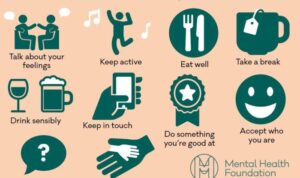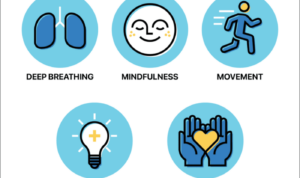Healthy Lifestyle Tips: Get ready to dive into the world of wellness with this ultimate guide that covers everything from physical benefits to mental well-being. Whether you’re looking to boost your energy or improve your mood, these tips have you covered.
From the importance of exercise to the significance of stress management, this guide will equip you with the tools you need to lead a healthier and happier life.
Benefits of a Healthy Lifestyle
Maintaining a healthy lifestyle comes with a plethora of benefits that positively impact both our physical and mental well-being. Let’s explore some of the advantages below.
Physical Benefits
- Increased energy levels: By fueling your body with nutritious foods and regular exercise, you’ll notice a boost in energy throughout the day.
- Weight management: A healthy lifestyle helps in maintaining a healthy weight, reducing the risk of obesity-related diseases.
- Stronger immune system: Eating a balanced diet and staying active can improve your immune system, making you less susceptible to illnesses.
- Improved cardiovascular health: Regular exercise and a healthy diet can lower blood pressure, reduce the risk of heart disease, and improve overall heart health.
Mental and Emotional Advantages
- Reduced stress and anxiety: Engaging in physical activity releases endorphins, which are known to reduce stress and anxiety levels.
- Better mood: A healthy lifestyle can enhance your mood and overall mental well-being, promoting a positive outlook on life.
- Enhanced cognitive function: Eating nutrient-rich foods and staying active can improve brain health, memory, and cognitive function.
Overall Well-being
- Improved quality of sleep: A healthy lifestyle can lead to better sleep patterns, ensuring you wake up feeling refreshed and rejuvenated.
- Increased longevity: Research shows that individuals who follow a healthy lifestyle tend to live longer, enjoying a higher quality of life in their later years.
- Enhanced self-esteem: Taking care of your body and mind through a healthy lifestyle can boost self-esteem and confidence levels.
Components of a Healthy Lifestyle: Healthy Lifestyle Tips
Regular exercise, proper nutrition, and effective stress management are key components of a healthy lifestyle. These factors work together to promote overall well-being and prevent various health issues.
Regular Exercise
Regular physical activity is crucial for maintaining a healthy lifestyle. Exercise helps improve cardiovascular health, build muscle strength, enhance flexibility, and boost mood. It also plays a significant role in weight management and reducing the risk of chronic diseases such as heart disease, diabetes, and obesity. Aim for at least 150 minutes of moderate-intensity exercise each week, including a mix of aerobic, strength training, and flexibility exercises.
Nutrition and Healthy Eating Habits
Nutrition is another vital component of a healthy lifestyle. Eating a balanced diet rich in fruits, vegetables, whole grains, lean proteins, and healthy fats provides essential nutrients for the body to function optimally. Avoiding processed foods, sugary drinks, and excessive salt can help reduce the risk of obesity, diabetes, and other health conditions. Stay hydrated by drinking plenty of water and practice mindful eating to listen to your body’s hunger and fullness cues.
Proper Stress Management Techniques
Effective stress management is crucial for overall health and well-being. Chronic stress can have negative effects on both physical and mental health, leading to issues such as high blood pressure, anxiety, and insomnia. Incorporate stress-reducing activities into your daily routine, such as meditation, deep breathing exercises, yoga, or spending time in nature. Prioritize self-care and make time for activities that help you relax and unwind to maintain a healthy balance in life.
Tips for Implementing a Healthy Lifestyle

Living a healthy lifestyle is all about making small, sustainable changes that can have a big impact on your overall well-being. Here are some practical tips to help you get started on your journey to a healthier you.
Setting Achievable Health Goals
- Start by identifying specific, realistic goals that are meaningful to you.
- Break down larger goals into smaller, manageable steps to track your progress.
- Set a timeline for achieving each goal to stay motivated and focused.
- Celebrate your successes along the way to maintain motivation and momentum.
Incorporating Physical Activity
- Find activities you enjoy, whether it’s dancing, hiking, or playing a sport.
- Set aside time each day for exercise, even if it’s just a short walk or stretching routine.
- Make movement a part of your daily routine, like taking the stairs instead of the elevator or parking farther away from your destination.
- Stay active with friends or family to make exercise more fun and social.
Creating a Balanced Diet Plan, Healthy Lifestyle Tips
- Fill your plate with a variety of colorful fruits and vegetables to ensure you’re getting essential nutrients.
- Include lean proteins, whole grains, and healthy fats in your meals to maintain energy levels and support overall health.
- Avoid processed foods high in added sugars, salt, and unhealthy fats, opting for whole, natural foods whenever possible.
- Stay hydrated by drinking plenty of water throughout the day and limit sugary beverages.
Importance of Mental Health in a Healthy Lifestyle

Maintaining good mental health is crucial for overall well-being as it directly impacts how we think, feel, and act in our daily lives. Neglecting mental health can lead to various issues such as anxiety, depression, and even physical health problems.
Strategies for Improving Mental Health
- Regular exercise: Physical activity releases endorphins, which are known as “feel-good” hormones that can help improve mood and reduce stress.
- Healthy diet: Eating nutritious foods can positively impact mental health by providing essential nutrients that support brain function.
- Social connections: Building and maintaining strong relationships with friends and family can help reduce feelings of isolation and loneliness.
- Seeking professional help: Consulting a therapist or counselor can provide valuable support and guidance in managing mental health issues.
Impact of Stress Reduction and Mindfulness Practices
- Stress reduction techniques such as deep breathing, meditation, and yoga can help lower cortisol levels and promote relaxation.
- Practicing mindfulness involves staying present in the moment, which can reduce rumination and improve overall mental well-being.
- Engaging in hobbies or activities that bring joy and relaxation can also contribute to a positive mindset and better mental health.












